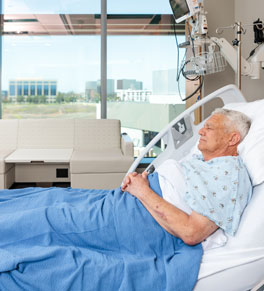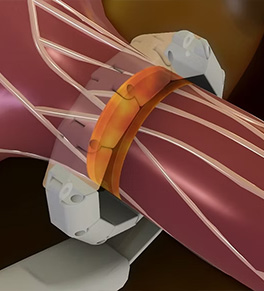
Arrhythmia
We can help you manage, and sometimes even cure, all types of arrhythmias — helping to improve your heart health and quality of life.
Arrhythmia symptoms
While everyone experiences arrhythmias differently, some common symptoms of arrhythmias include:
- A rapid heartbeat
- Pounding in your chest
- A flip-flopping feeling in your chest
- Fatigue
- Shortness of breath
- Dizziness
- Fainting
- Chest pain
Sometimes arrhythmias do not cause any symptoms. Instead, your physician may detect an irregular heartbeat during a routine exam or test.
When to seek care for arrhythmia
Whether your symptoms are mild, severe or nonexistent, an arrhythmia is serious and requires treatment.
When your heart’s electrical system isn’t working right, blood is not pumping to the rest of your body properly. This can lead to life-threatening issues, like blood clots and stroke.
That’s why it’s so important to talk to your UCI Health primary care physician or cardiologist about your arrhythmia symptoms. For certain arrhythmias, they may refer you to an electrophysiologist, a cardiologist who focuses specifically on treating heart rhythm problems (arrhythmia).
Your care team will do a physical exam and will likely recommend diagnostic tests. This will help them determine the type and location of your arrhythmia. From there, they will discuss different treatment options with you.

Schedule an appointment
Find out about your arrhythmia treatment options from one of our arrhythmia specialists.
Call 714-456-6699 to make an appointment or

Find a cardiology clinical trial
Talk to your doctor to see if a cardiology clinical trial is right for you.
Featured Blog Posts

Inspired by nature, created for healing

Superfood meals: Fuel for healthy aging

First U.S. test of nerve-blocking device for resistant hypertension
Procedure zaps renal artery nerves linked to hypertension without damaging the blood vessel.
Types of arrhythmias
There are many different types of arrhythmias. They are located either in the upper or lower chamber of your heart.
At UCI Health, we specialize in pinpointing the exact location and type of arrythmia you have. This allows us to make sure you’re getting the most effective treatment.
Some types of arrhythmias we treat are:
- Atrial fibrillation (AFib)
- Atrial flutter
- Bradycardia
- Long QT syndrome
- Premature beats
- Tachycardia
- Ventricular fibrillation
Arrhythmia diagnosis at UCI Health
If left untreated or undiagnosed, arrhythmias can cause increasingly debilitating symptoms and life-threatening complications, like stroke.
While arrhythmias can be difficult to diagnose, our cardiologists specialize in identifying the specific cause of your irregular heartbeat.
Our clinicians
Arrhythmia treatment at UCI Health
To determine the best treatment for you, your electrophysiologist factors in:
- The type of arrhythmia you have
- The location of the arrhythmia
- Your symptoms
- Your lifestyle
- Your goals for treatment
- Your preferences
They’ll also review the risks and benefits of each treatment. From there, they’ll tailor a treatment plan specifically for you.
Stroke prevention
If you have AFib, the most common type of arrhythmia, you have an increased risk of stroke. That's why our treatment plans focus heavily on stroke prevention.
We offer several stroke prevention treatments, including:
- Blood thinners: Taking daily blood thinners helps lower your risk for stroke.
- Left atrial appendage closure: During this minimally invasive procedure, commonly known as Watchman, your clinician will implant a device that prevents blood clots. This lowers your risk of stroke.
Why choose UCI Health for arrhythmia care?
Your partner in care
Most arrhythmias are manageable and sometimes even curable. Our cardiology and electrophysiology teams will work with you to develop a treatment plan tailored to your symptoms and lifestyle. They’ll take the time to help you understand what to expect every step of the way.
Minimally invasive arrhythmia treatments
Our team is highly experienced in treating some types of arrhythmias, like atrial fibrillation (AFib), with minimally invasive cardiac ablation. UCI Health has high success rates for treating arrhythmias with ablation. For instance, our cure rate for AFib with cardiac ablation is about 70%. And cure rates for SVT or atrial flutter are around 80% to 85%.
Clinical trials for arrhythmias
As the only academic health system in Orange County, UCI Health leads and participates in clinical trials for arrhythmias. These trials look at new, effective ways to treat or even cure arrhythmias. You may have access to these therapies that are not yet widely available.




